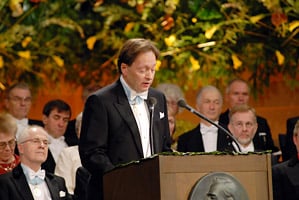Award ceremony speech
Presentation Speech by Professor Horace Engdahl, Permanent Secretary of the Swedish Academy, Member of its Nobel Committee,
 |
| Professor Horace Engdahl delivering the Presentation Speech for the 2006 Nobel Prize in Literature at the Stockholm Concert Hall. Copyright © The Nobel Foundation 2006 Photo: Hans Mehlin |
Your Majesties, Your Royal Highnesses, Ladies and Gentlemen,
In his book about his native Istanbul, Orhan Pamuk describes how, as a young man, he was enraptured by a magnificent volume of early 19th century engravings depicting the erstwhile capital of the vast Ottoman empire . The artist was German, embodying European landscape painting techniques and outlook — that combination of daydreaming and curiosity about the world that we call the picturesque and that was still alien to Turkish culture. But it was with genuine Istanbulite knowledge that the painter, after many years working in the city, saw the palaces, streets, throngs and the play of light on the Bosphorus waters. He had to be both Easterner — to understand what he was seeing — and Westerner to have the method to portray it.
Orhan Pamuk is describing here his own double view of reality. When Pamuk uses the Western form for the novel, it sheds its firm central perspective, tied to the protagonist’s actions and emotions. Instead, we are drawn into a labyrinth of stories and beliefs, where the person we identify with can at any moment meet himself as a stranger, advancing from another direction, from another life or another culture.
In My Name is Red, Pamuk uses a sultan’s painters of miniatures in 1590s Istanbul to stage a conflict between Western individualism and Eastern traditionalism. As the novel presents it, the classic Muslim standpoint is that paintings must illustrate familiar stories. To portray only what the eye sees in nature is a blasphemy. Ideally, one should paint from memory, painting the essence of the object and not its appearance, discarding everything extraneous and elevating oneself to Allah’s view of the world. To leave traces in the work that can be identified as personal style was seen by the ancient masters as proof of ineptitude. For them, Western portraiture expressed a sinful desire to show pride before God. Anyone who would allow himself to be thus portrayed, believes himself to be singularly important and positions himself at the world’s centre, as does the deliberately original artist with his style. Such a person will no longer bow to authorities but assumes the right to doubt everything and anything. That unique brushstroke, when the painter’s hand obeys only his gaze, is a movement that threatens to topple every holy truth.
The choice between alternative views in the novel is seductively simple for a modern reader, but is revealed to be treacherous. At the same time as Pamuk, through his way of writing, appears to be on the side of personal style, he questions whether the unique stroke actually exists. Do not both love and art imply the imitation of gestures we have seen in others?
In Pamuk’s major work, The Black Book, civilisation appears as a boundless plagiarism where people flee into each other’s imagined lives to be free from themselves and experience love. You become what you describe. The Black Book is an odyssey through a night-time Istanbul full of genies and semi-beings, a city where invented stories attract more credibility than the true, and truth is a shadow on the wall. A dream world and a metaphor for the cosmos. Man’s helpless need for narration has seldom been described more tellingly. Like Oscar Wilde pointing out that the Thames fog was imitating Turner’s painting, Pamuk shows that the real Istanbul exists only because of its fabulists.
In his novel Snow, Pamuk travels to a forgotten town on a remote Turkish border. This displacement, no less drastic than a journey from Earth to Moon, gives him the opportunity to take a geological core sample of all levels of Turkish society, from the loyal state establishment to disappointed leftist intellectuals, Islamic fundamentalists, Kurds and the mystically suicidal girls fighting for the right to wear veils. In the centre of the story stands a Western-influenced poet looking for a way back from exile. Snow has been called a political novel, but more than the expression of an opinion, it is, like Dostoyevsky’s Demons, a criticism of politics and its impact on the human mind. The fanatic’s conviction stems from a blindness to the motivations of others. Against this, Pamuk puts the writer’s emphatic identification with all his figures, beyond good and evil. The inherent irony of the events is the only judgment that he passes. The novel’s charismatic fundamentalist, who terrifies the authorities and bewitches the woman the poet wants to love — on a mystic level, their struggle is Orpheus’s defeat by Dionysus — this death-defying terrorist first of all strives to have his threats against Europe published in one of the big German newspapers so that the West will pay him notice. In the end, Snow is a book about the right to uncertainty and vacillation, about love as a lifelong defeat and about the longing for God.
Most honoured Orhan Pamuk! You have made your native city an indispensable literary territory, equal to Dostoyevsky’s St. Petersburg, Joyce’s Dublin or Proust’s Paris – a place where readers from all corners of the world can live another life, just as credible as their own, filled by an alien feeling that they immediately recognise as their own.
I would like to express the warm congratulations of the Swedish Academy as I now request you to receive this year’s Nobel Prize for Literature from the hand of His Majesty the King.
Nobel Prizes and laureates
Six prizes were awarded for achievements that have conferred the greatest benefit to humankind. The 14 laureates' work and discoveries range from quantum tunnelling to promoting democratic rights.
See them all presented here.
